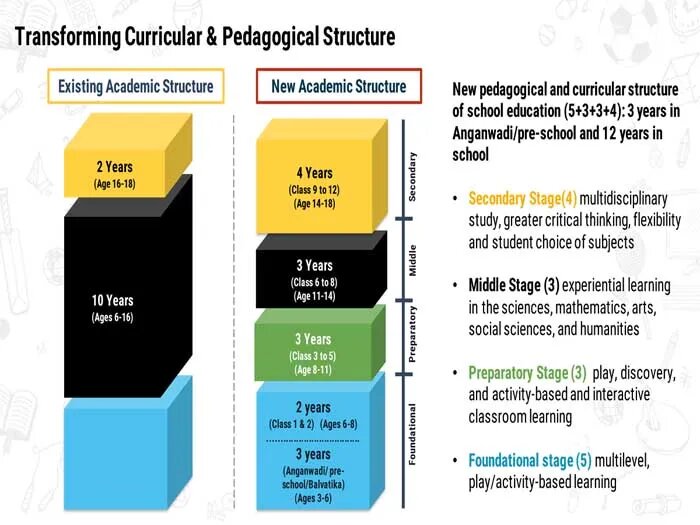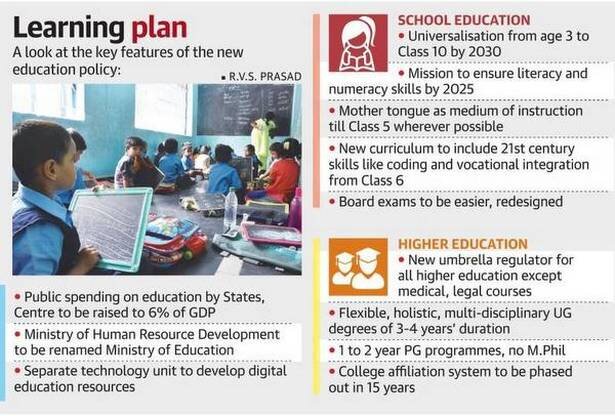Why in News
Recently, the Union Cabinet has accepted the new National Education Policy (NEP), 2020 with an intention to introduce quite a few modifications in the Indian schooling machine - from the college to university level.
The NEP 2020 objectives at making “India a world information superpower”.
The Cabinet has also permitted the renaming of the Ministry of Human Resource Development to the Ministry of Education.
The NEP cleared by using the Cabinet is solely the 0.33 principal revamp of the framework of training in India because independence.
o The two before training insurance policies had been added in 1968 and 1986.
Key Points
School Education:
o Universalization of schooling from preschool to secondary degree with a hundred percent Gross Enrolment Ratio (GER) in college schooling through 2030.
o To convey two crore out of college teens lower back into the mainstream thru an open training system.
o The modern 10+2 machine to be changed by means of a new 5+3+3+4 curricular shape corresponding to a long time 3-8, 8-11, 11-14, and 14-18 years respectively.
• It will carry the uncovered age team of 3-6 years beneath college curriculum, which has been identified globally as the necessary stage for improvement of intellectual schools of a child.
• It will additionally have 12 years of training with three years of Anganwadi/ pre schooling.
o Class 10 and 12 board examinations to be made easier, to check core capabilities instead than memorised facts, with all college students allowed to take the examination twice.
School governance is set to change, with a new accreditation framework and an unbiased authority to adjust each public and non-public schools.
Emphasis on Foundational Literacy and Numeracy, no inflexible separation between educational streams, extracurricular, vocational streams in schools.
Vocational Education to begin from Class 6 with Internships.
Teaching up to at least Grade 5 to be in mom tongue/regional language. No language will be imposed on any student.
Assessment reforms with 360 diploma Holistic Progress Card, monitoring Student Progress for reaching Learning Outcomes
A new and comprehensive National Curriculum Framework for Teacher Education (NCFTE) 2021, will be formulated with the aid of the National Council for Teacher Education (NCTE) in session with National Council of Educational Research and Training (NCERT).
o By 2030, the minimal diploma qualification for educating will be a 4-year built-in B.Ed. degree.
Higher Education:
o Gross Enrolment Ratio in greater training to be raised to 50% via 2035. Also, 3.5 crore seats to be introduced in greater education.
• The modern Gross Enrolment Ratio (GER) in greater schooling is 26.3%.
o Holistic Undergraduate training with a bendy curriculum can be of three or four years with a couple of exit preferences and excellent certification inside this period.
o M.Phil publications will be discontinued and all the publications at undergraduate, postgraduate and PhD degree will now be interdisciplinary.
o Academic Bank of Credits to be hooked up to facilitate Transfer of Credits.
o Multidisciplinary Education and Research Universities (MERUs), at par with IITs, IIMs, to be set up as fashions of satisfactory multidisciplinary training of world requirements in the country.
o The National Research Foundation will be created as an apex physique for fostering a robust lookup lifestyle and constructing lookup potential across greater education.
o Higher Education Commission of India (HECI) will be set up as a single umbrella physique for the complete greater education, aside from scientific and prison education. Public and personal greater schooling establishments will be ruled through the identical set of norms for regulation, accreditation and tutorial standards. Also, HECI will be having 4 impartial verticals namely,
• National Higher Education Regulatory Council (NHERC) for regulation,
• General Education Council (GEC) for widespread setting,
• Higher Education Grants Council (HEGC) for funding,
• National Accreditation Council (NAC) for accreditation.
o Affiliation of faculties is to be phased out in 15 years and a stage-wise mechanism to be installed for granting graded autonomy to colleges.
• Over a duration of time, each and every university is anticipated to boost into both an self sufficient degree-granting College, or a constituent university of a university.
o
• An self reliant body, the National Educational Technology Forum (NETF), will be created to furnish a platform for the free alternate of thoughts on the use of science to beautify learning, assessment, planning, administration.
• National Assessment Centre- 'PARAKH' has been created to verify the students.
• It additionally paves the way for overseas universities to set up campuses in India.
• It emphasizes putting up of Gender Inclusion Fund, Special Education Zones for deprived areas and groups.
• National Institute for Pali, Persian and Prakrit, Indian Institute of Translation and Interpretation to be set up.
• It additionally objectives to amplify the public funding in the Education area to attain 6% of GDP at the earliest.
• Currently, India spends round 4.6 percent of its whole GDP on education.
Education In India
o Part IV of Indian Constitution, Article forty five and Article 39 (f) of Directive Principles of State Policy (DPSP), has a provision for state-funded as properly as equitable and reachable education.
o The forty second Amendment to the Constitution in 1976 moved schooling from the State to the Concurrent List.
• The schooling insurance policies by using the Central authorities presents a extensive course and kingdom governments are predicted to observe it. But it is now not mandatory, for occasion Tamil Nadu does no longer comply with the three-language formulation prescribed via the first schooling coverage in 1968.
o The 86th Amendment in 2002 made training an enforceable proper beneath Article 21-A.
o Right To Education (RTE) Act, 2009 ambitions to supply important training to all young people aged 6 to 14 years and enforces schooling as a Fundamental Right.
• It additionally mandates 25% reservation for deprived sections of the society the place deprived groups
o Sarva Shiksha Abhiyan, Mid Day Meal Scheme, Navodaya Vidyalayas (NVS schools), Kendriya Vidyalayas (KV schools) and use of IT in schooling are a end result of the NEP of 1986.
Way Forward
A New Education Policy pursuits to facilitate an inclusive, participatory and holistic approach, which takes into consideration subject experiences, empirical research, stakeholder feedback, as properly as training realized from exceptional practices.
It is a revolutionary shift toward a extra scientific strategy to education. The prescribed shape will assist to cater the capacity of the baby – levels of cognitive improvement as nicely as social and bodily awareness. If carried out in its proper vision, the new shape can convey India at par with the main nations of the world.



No comments:
Post a Comment